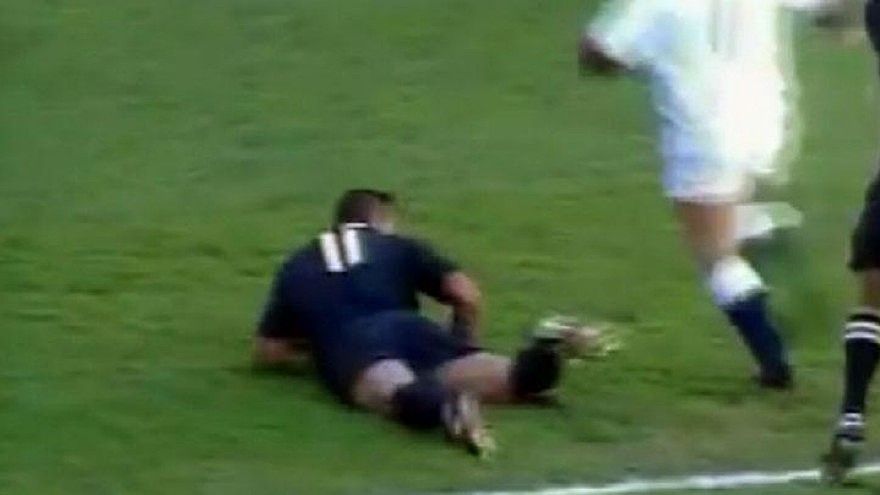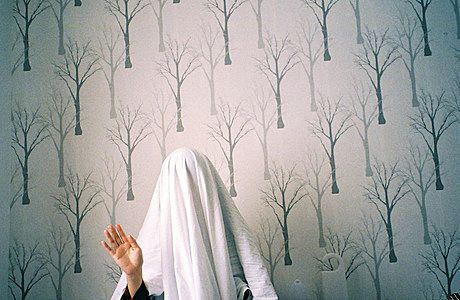Goodbye, Number 11
Ben Stanley remembers a childhood hero.
Some hearts can only beat for so long. They are so big, and have to sustain so much, that they’re always on borrowed time.
Jonah Lomu had one of those hearts. In the early hours of Wednesday morning in Auckland, after 40 years of good, honest work, it stopped. With it ended the life of arguably the most loved rugby player the world has ever – and perhaps will ever – see.
How do you describe Jonah? A picture of him at his very best is a good place to start: he was a colossus. Two massive brown tree-trunk legs; hard, sinewy and long like kauri logs. That brutally powerful right-arm fend. Just the silhouette of Jonah in action remains a silhouette of rugby at its best.
The Big Man! Nearly unstoppable in that All Black jersey, the white number eleven on his back; a number also nicked into his left eyebrow and inked onto his chest. The tuft of hair on his forehead. ‘Power Within’ tattooed across on his back.Jonah! Thundering down the left touch-line. Here he comes! Jonah! Come on, Jonah!
Straight into, straight over, Mike Catt in the 1995 World Cup semi-final against England in Cape Town; a scene that will be on endless video replay (once on VHS, now on YouTube) for as long as people watch rugby. Back then, Jonah was a 20-year-old kid, and he still wanted New Zealand to win with all the seething intensity of a teenage spectator.
“Guys, I’m ready to die for the black jersey,” he told his teammates the night before. After Catt, they believed him.
In a way unlike any of the events before, or since, this World Cup was defined by a player. Jonah WAS 1995. Yes, victory for South Africa – and the image of Nelson Mandela wearing Francois Pienaar’s #6 jersey – helped symbolise the recovery of a nation wounded by apartheid. But Jonah was The Big Man.
Straddling the era from semi-professional to professional in the mid-90s, Jonah – with respect to Colin Meads, Philippe Sella and Hugo Porta - was the sport’s true superstar, a name people who didn’t watch rugby could recite the way people who didn’t watch basketball knew Jordan and people who don’t watch the Olympics today know Bolt.
Without hyperbole, after 1995 Jonah literally changed the game. He bought money and glamour to rugby. He bought eyeballs to screens. For the first time beyond its bastions, rugby union really was Something To Watch. From his Beverly Hills estate, Rupert Murdoch saw Jonah in action at Ellis Park, and wanted in. He’d pour hundreds of millions into SANZAR – the newly-formed body that oversaw South Africa, New Zealand and Australian rugby – and helped turn it into the slick, polished spectacle it is today.
They were even noticing him in America. Imagine that. The Dallas Cowboys offered him a contract, and he was close to accepting. Hell, had he been born in Texas or California, he would have been a Jim Brown or an Emmitt Smith.
But Jonah was a Kiwi. He loved playing for the All Blacks. There wasn’t another sporting apex out there. How could he leave?
In New Zealand, rugby is like what football is in Brazil. It is much more than a religion, or a way of life; it is the heartbeat that the entire nation lives and breathes by. Without it, what would we be? Who would we be?
When they win, the nation rejoices, the economy booms and the sun never seems to set. When they lose, the entire nation contracts into itself. It becomes insular and gothic; a toxic stew of finger-pointing talkback radio and editorials blaming educators, professionalism, women, the government.
It is this wrestling with rugby and its part in our national identity that we continue to struggle with today – and will one day need to throw off if we really wish to grow – but it is also the fervor that helped produce Jonah.
He did it tough, growing up. We all know the story. Straight outta Mangere. His Dad give him the whack, and he’d mix it up with some rough mates. Scraps; nicking cars, the works.
But his mum got him a spot at Wesley College – that great rugby school that punched above its weight – and everything changed. Jonah might have been teased when he turned up to athletics meets in bare foot or jandals, but he’d break all the records. He’d become a schoolboy rugby sensation, and become, in 1994, the youngest All Black ever to play. Only 18. That record still stands today – and will likely never be broken.
We only got ten years of Jonah in rugby. In fact, ten years is a stretch, granting him a short, brave tail as he charged through the sapping effects of a kidney transplant. Just 59 tests for the All Blacks, finished at the international level in 2002. Jonah was only 27 when he played his last game for New Zealand.
But when he was good, man, The Big Man was immense. The great cliché of mythology is sports comes from having your name reduced to just one word: Pele, Ronaldo, Babe, Michael, LeBron, Roger, Sachin.
To say Jonah was the Michael Jordan or Babe Ruth of rugby is more than that measure of fame beyond the fans. It means that when people talk about rugby in a hundred years time, they’ll talk mention his name a fair amount. They’ll talk about Jonah and how - like Michael - he seemed to warp time and space when he was playing. How the gravity of any match depended on his movements, his direction. How everyone was just waiting for him to touch ball; waiting for that something special to happen when he did.
But Michael had longer at the top, as did Pele and the Babe. Jonah’s fire burnt brightly, and went out quick. No real theatrics either – no speeches, no flashy reinventions after his prime. Perhaps that’s due to his upbringing in New Zealand, a culture long uncomfortable with success and how one should act when it is achieved.
Do your job, do it well and be a good bastard about it: we’re told down here. Jonah, both on the rugby field and off it, lived that mantra exactly. More than anything, for him though, it was that last part: be a good bastard. He was. Man, he was one of the best.
You won’t find someone with a bad story about Jonah. You simply won’t. He wasn’t perfect - who is? As a rugby player, he had his failings – always a bit shaky on defense in his eagerness to forge forward – while off the paddock, he was never the best with money, or women. Cars would be impounded. Marriages broke up.
But the Big Man had heart. Always did. Gratitude seemed to drip from him. He saw smiles and smiled back, and he knew what he meant to people. Everywhere. Whether it was in New Zealand, down at a local fish and chip shop or gas station, or in London, or Paris. There are plenty of great Jonah stories floating the world right now. Here’s hoping they get re-told this week, for years and years to come. Virtually everyone’s got one in New Zealand. That’s how it is down here – we’re still so small that it works like that. Stories about sitting next to him on a plane. About him turning up to your workplace because his car had broken down, and asking for jumper leads. About bumping into him in London, and talking about cars with him. Man, Jonah loved his cars.
My Jonah story happened when I was a kid, just before the 1995 World Cup. The All Blacks did a pre-tournament training camp in Taupo - my hometown - at our modest rugby ground, Owen Delaney Park.
A whole generation of childhood heroes were there. Never again will a group of people that I’ll never know mean so much to me; Fitzy and Zinny, Merts, Goldie and Buncey, Kamo, Rushy, Macca and Oz. And Jonah. The Big Man - will your heroes ever be as big as they are to you when you’re 11 years old? I got his autograph, and got that grin.
For a certain kind of Kiwi kid, Jonah was like the bigger student who protected you from the bully at school. And like that kid back then, it wasn’t just the strength and size you remember - it was that feeling, that he really did care. Jonah was strong for us when we needed that strength. We saw that on the rugby field. But as we grew up, he got weaker – and it was more than that perception as you grow up, more than the surprise of returning to something huge and realising it wasn’t.
He’d had always been sick, in one way or another. His kidneys had always caused him problems. Ingeniously, they tucked the transplant under his rib cage so he could play – but Jonah’s time on the rugby paddock was long since up, though no one wanted to be the first to say it.
In much the same way, we all knew deep down that Jonah wouldn’t make it to ripe old age, wouldn’t get to be a beaming, toothy Fred Allen or Bob Scott. We knew his body wouldn’t last. We kept loving him, and hoping we would be wrong. Sadly, we wouldn’t.
“To me, it’s like life,” Jonah said once, about rugby. “It’s a short way of living your life fast.”
I cried that night in 1995, when we lost that final against South Africa at Ellis Park. My parents had woken me in the early hours of the morning to see the game on TV, and my heart was broken for the first time. Jonah had given all he could, but it wasn’t enough.
I cried on Wednesday night too, as I’m sure many, many other New Zealanders, and rugby fans around the world, did. I cried for a Tongan kid from South Auckland; someone from our tiny, removed little corner in the world who became something greater than himself.
I cried thinking about a man blessed with a great big body built for rugby, and an even bigger heart, built for something far, far larger than just pumping his own blood around. A global sporting treasure –our treasure. Wednesday morning in Auckland, that big heart stopped beating. He’d given all he could, and it was more than enough.

